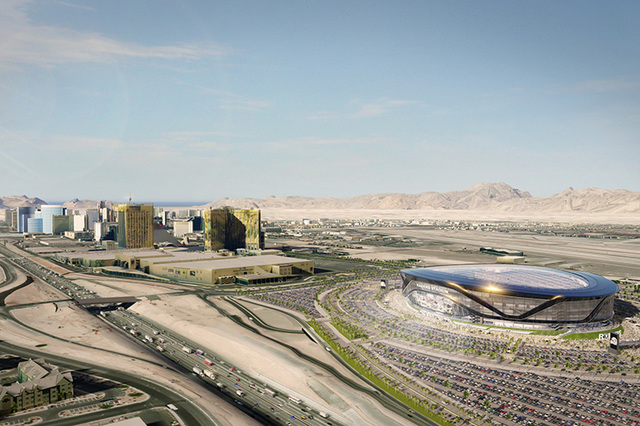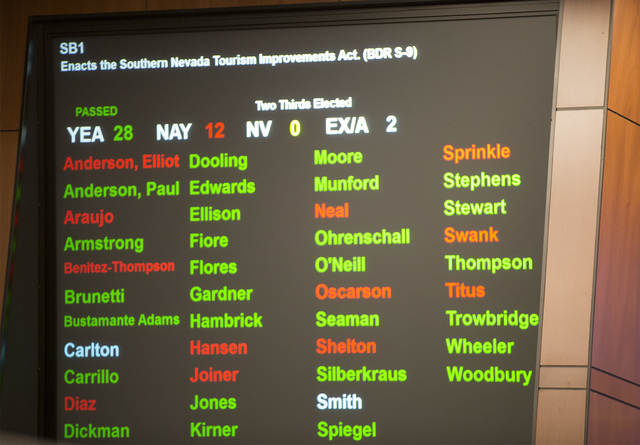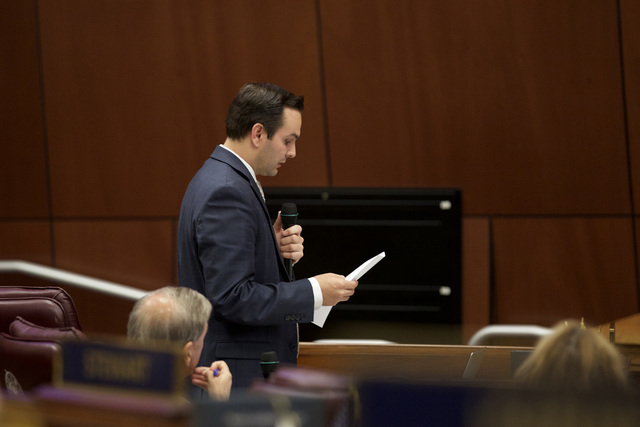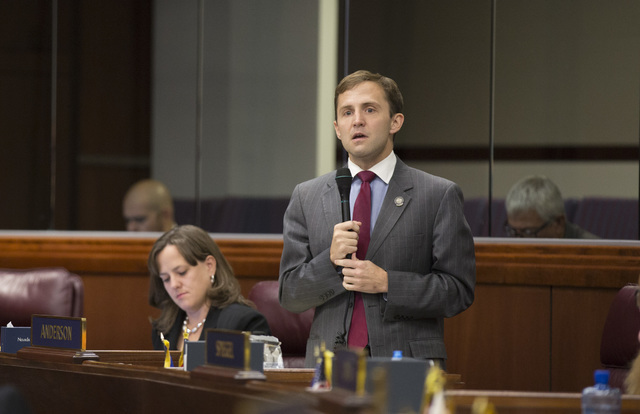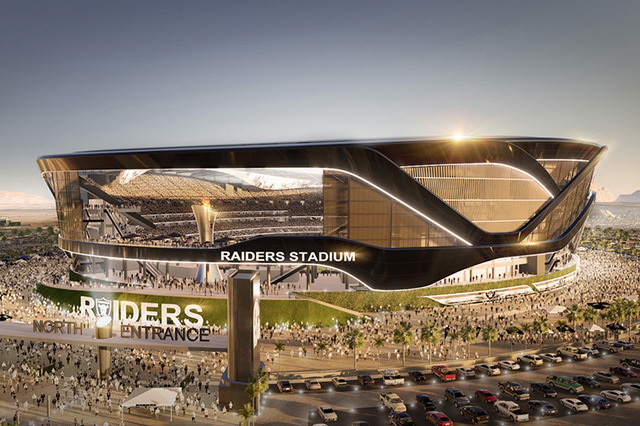Nevada Senate passes amended Raiders stadium bill; Sandoval to sign Monday
CARSON CITY — A supermajority of Nevada lawmakers on Friday passed an increase in Clark County’s hotel room tax to help finance a 65,000-seat domed stadium, clearing the path for the relocation of the NFL’s Oakland Raiders to Las Vegas.
Senate Bill 1, which was amended to address concerns of some Assembly members, saw final passage when the Senate agreed to the changes early Friday afternoon, capping a weeklong special session.
Gov. Brian Sandoval will sign the bill in Las Vegas on Monday.
The bill includes a separate hotel room tax increase to help fund $1.4 billion in improvements to the Las Vegas Convention Center. The projects were touted as tourism drivers that would help fill Las Vegas hotel rooms, but the $1.9 billion stadium, which would be home for the Raiders and the UNLV football team, drove this week’s debate.
Now Las Vegas, which just four months ago was the largest metropolitan area in the United States without a major-league sports franchise, is on the cusp of having two teams. An expansion NHL team will begin play at T-Mobile Arena in a year, and the Raiders likely would play games off the Strip no later than 2020.
“Nevada has a past unlike any other state, but it is the ability to write a new narrative and redefine our state’s image that makes us so unique and so capable of innovating once again through the new Nevada,” Sandoval said in a statement. “This is the beginning of the next chapter of southern Nevada’s continued dominance in tourism, conventions and hospitality and presents an exciting opportunity for UNLV.”
With SB1 awaiting the governor’s signature, the spotlight now turns to the Raiders’ quest to relocate. Raiders owner Mark Davis has pledged to move the team to Las Vegas, provided three-fourths of NFL team owners (24 of 32) approve. Under the proposal, the family of Las Vegas Sands Corp. Chairman and CEO Sheldon Adelson will contribute $650 million toward the stadium project, the Raiders will kick in $500 million and the remaining $750 million would be funded by bonds backed by the room tax increase.
Raiders officials had indicated that if the stadium deal passed, they would present a plan and officially announce their intentions to move to Las Vegas at next week’s NFL owners meeting in Houston. A vote on relocation could come at a January owners meeting, also in Houston.
Andy Abboud, vice president of government relations and community development for Las Vegas Sands, who led negotiations on behalf of the Adelson family, said: “At the end of the day, the weight of the arguments and the economic opportunity clearly carried the day.
“It was a lot of hard work, but it was also one of the most incredible coalitions in the history of the state of Nevada,” Abboud said. “You had everyone calling legislators. Not only was Las Vegas Boulevard and the Strip consolidated on this, but all the building construction unions were behind this and even people were calling from the Tesla organization, Faraday (Future) and Switch. It’s become a great source of community pride and I think everybody should be happy for that and proud of that.”
Asked about Adelson’s reaction, Abboud said: “I think he was very pleased. I don’t think he was too surprised because in his estimation he always thought this was a logical project. I think he was flattered by the support, but he has always been very clear that this is for the community.”
UNLV TWEAKS
The big question Friday was whether there were enough votes in the Assembly.
A two-thirds vote was required in the 42-member Assembly, and there was doubt as to whether enough lawmakers would support the 0.88 percentage-point room tax increase to fund the stadium and the half-point increase for the convention center.
But when Assembly members pushed the red or green buttons for no or yes, 28 Democrats and Republicans opted to support both projects. Nine Democrats and four Republicans voted no.
The amendment to the bill passed by the Assembly expanded the Stadium Authority Board to nine members from seven, adding another representative from Clark County and one from UNLV. The amendment also defines the rent to be charged to the university to use the stadium to “actual operational or pass-through costs” excluding any fixed costs on game or event days. UNLV also gets three additional event days, for graduations or other events.
The Assembly vote followed favorable Senate action on Senate Bill 1 on Tuesday, where 16 lawmakers supported and five opposed the bill.
‘NEXT-GENERATION OPPORTUNITIES’
Lawmakers debated the proposals for four days after being called into special session by Sandoval, who announced ahead of time he was in favor of both projects.
Assembly Majority Leader Paul Anderson, R-Vegas, who helped push the bill through the Assembly, said Senate Bill 1 will result in an economic environment that will put Nevadans back to work.
“These two projects will provide 13,000 permanent jobs with nearly $1.5 billion in new dollars into the Las Vegas Valley, while keeping our tourism industry competitive,” he said.
The bill will put construction workers back to work with livable wages and help existing local businesses grow, Anderson said.
Speaker John Hambrick, R-Las Vegas, said the bill will help UNLV as well with a new stadium for its football program.
“It is time that UNLV has a facility that will help the program grow,” he said.
The Las Vegas Metro Chamber of Commerce also praised the vote.
Kristin McMillan, president and CEO of the chamber, said: “These are the next-generation opportunities that will propel our city forward, and the expected returns to the community will be significant: thousands of new jobs, significant increases in visitor spending, and more public revenue for our state’s general fund, for local governments and for education.”
LATE-NIGHT DRAMA
There was no shortage of drama in the marathon session that started shortly after 8 a.m. on Thursday and didn’t end until 1 a.m. Friday.
In addition to the uncertainty about whether there were 28 Assembly votes for the infrastructure projects, the bill ran into strong questioning after the Review-Journal reported on a study for the Nevada Department of Transportation that found nearly $900 million in already-planned road projects would need to be accelerated to support the stadium.
The story provoked wide reaction on Twitter, with several lawmakers and critics of the stadium project asking why the information was not presented to the Legislature during hearings this week.
The report prompted Sandoval’s office to bring Rudy Malfabon, director of the Transportation Department, and Chief of Staff Mike Willden, to the Assembly chambers to discuss the document, which is dated Oct. 4. The agency reported no fiscal impact from the stadium proposal, but critics asked why it was not presented during the hearings.
If the Raiders don’t move to Southern Nevada, the bill allows a lower room tax increase to generate $300 million toward the construction of a smaller stadium for UNLV, provided the university can raise $200 million in private donations within two years.
The stadium would be owned by the public. Any profits from the stadium, however, would flow to the private investors, a point that generated much of the opposition to the project.
The Review-Journal is owned by the family of Sheldon Adelson, chairman and CEO of Las Vegas Sands Corp.
Las Vegas Review-Journal writer Rick Velotta contributed to this report. Contact Sean Whaley at swhaley@reviewjournal.com or 775-461-3820. Follow @seanw801 on Twitter. Contact Sandra Chereb at schereb@reviewjournal.com or 775-461-3821. Follow @SandraChereb on Twitter.
RELATED
As expected, road to stadium passing was rocky
Oakland Raiders owner Mark Davis praises 'historic day' in Nevada
Tina Kunzer-Murphy says stadium 'a giant step' for UNLV football
Here's what people are saying about the Raiders stadium bill passing



